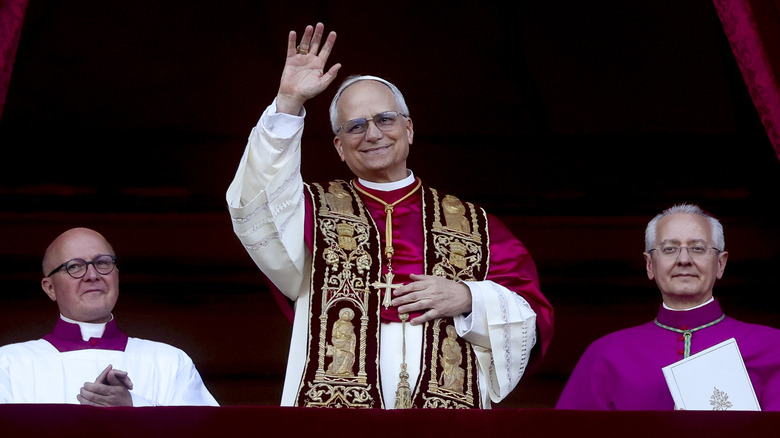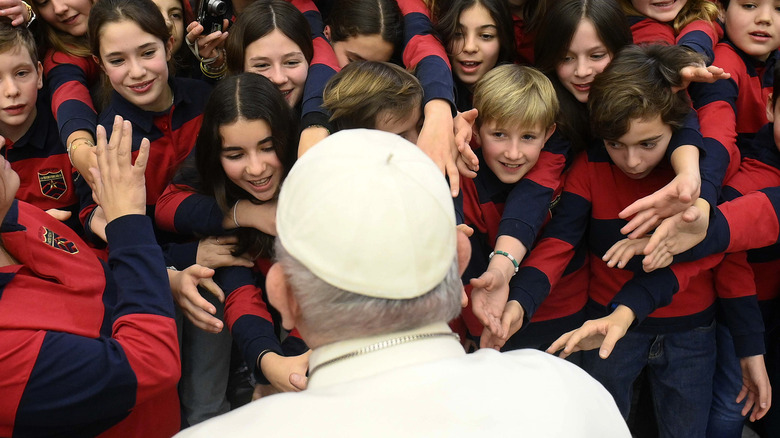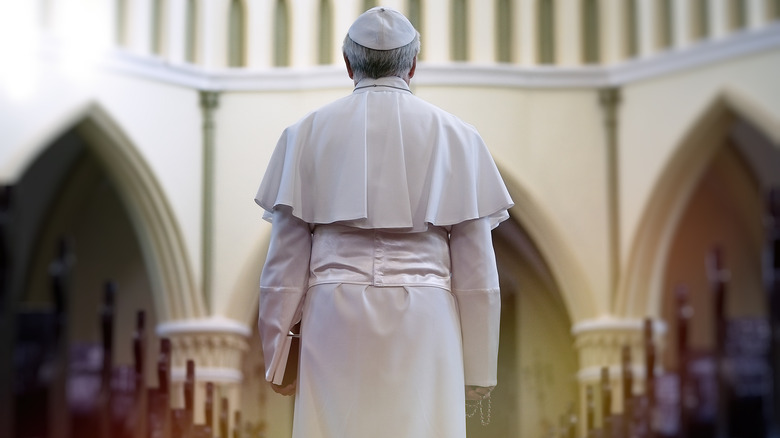Bizarre Rules The Pope Has To Follow
Both a political and a religious leader, the Pope – or the Holy See of the Roman Catholic Church's central government — is one of the five most influential people on the planet. It's been that way for some 2,000 years, as faithful Roman Catholic followers from all over the world turn to the papacy — housed in Vatican City in Italy — for social, religious, and even sometimes political guidance. Ideally, presidents and other political leaders are democratically elected, while monarchs are ordained by God, or so the outdated divine right of kings theory goes.
How exactly does the pope reach this commanding position in the Vatican, ruled over like a sovereign country in Italy, not to mention maintain his influence over countless Roman Catholics worldwide? Once in that important role, appointed by a College of Cardinals or senior church officials, are there any strange procedures and protocols that go along with this ancient and influential position in the Roman Catholic church, or any unique qualifications that must be satisfied for a man to get the job? And yes, the pope is always a man. Medieval Pope Joan, said to perhaps be the only female pope in history is most likely a myth. As it turns out, the Roman Catholic papacy is a rare job to obtain and an even more difficult role to maintain.
Popes must speak more than one language
As mentioned, popes have an influence all over the and popes are required to be multilingual, but not for the reason you think. For instance, the late Pope Francis was born in Argentina, making his native language Spanish. He was also able to speak Italian, French, German, and Portuguese. Pope Leo can speak English, French, and Portuguese, and he can also understand German. Other popes in the past have spoken many more languages than that, and one might assume that the pope would be required to be multilingual to communicate with his followers in the language they speak, but that's not the case. The only two languages all popes must be fluent in are Latin, the classical language of mass, and Italian, the language of Vatican City and Italy.
That language requirement is a bit surprising for a post that, in theory, is open to anyone worldwide and speaks for international Roman Catholic cultures. To reach that position of power, each pope gets elected by a College of Cardinals, and interestingly enough, the previous pope in power appoints those cardinals. Once there, popes remain in their position for life, and the old forehead hammer tap to determine if a pope has died may very well be a myth, as Snopes explains. Must the pope, though, work his way up through the ranks of the Roman Catholic church, from deacon to priest, bishop, archbishop, and then cardinal? There's a saying in American politics that anyone can become president. To some extent, that's also true of the papacy.
The pope need only be baptized
Another surprising rule the pope has to follow is that the highest position in the Roman Catholic church need only be filled by a baptized man (no women allowed, sorry, "Pope Joan"). Popes are not required to be ordained or to work their way up through the church hierarchy. Surely a position that influential would have an age requirement, or so one might assume. If a career in the church beyond baptism is not required, then what about life experience? Apparently, there is no minimum age requirement to become a pope. The youngest pope in history was Benedict IX, believed to have been elected at the age of 12 in the 11th century.
There's some uncertainty about how old Benedict was. Still, church historians agree he was almost certainly a teenager when he was elected, the first of three times he obtained the papacy in his lifetime. Popes are also barred from owning anything, which works out, because all that a pope needs — including a private hospital — is provided for him. Popes can and most often do choose their own name once elected, but a name change is not required. The name Peter, the first pope, is retired, and there have been more Pope Johns than any other name chosen. Linus, Hyginus, Zephyrinus, and Dionysius have all been used only once in church history.


